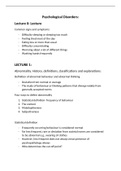Class notes
Intro to psychology Part 1: Psychological disorders
- Institution
- University Of Cape Town (UCT)
This is a summary of a lecture series that covered Psychological Disorders, namely Mood Disorders, Eating Disorders, Anxiety Disorders and Schizophrenia.
[Show more]



